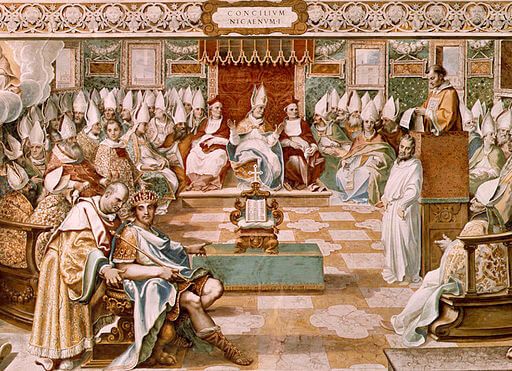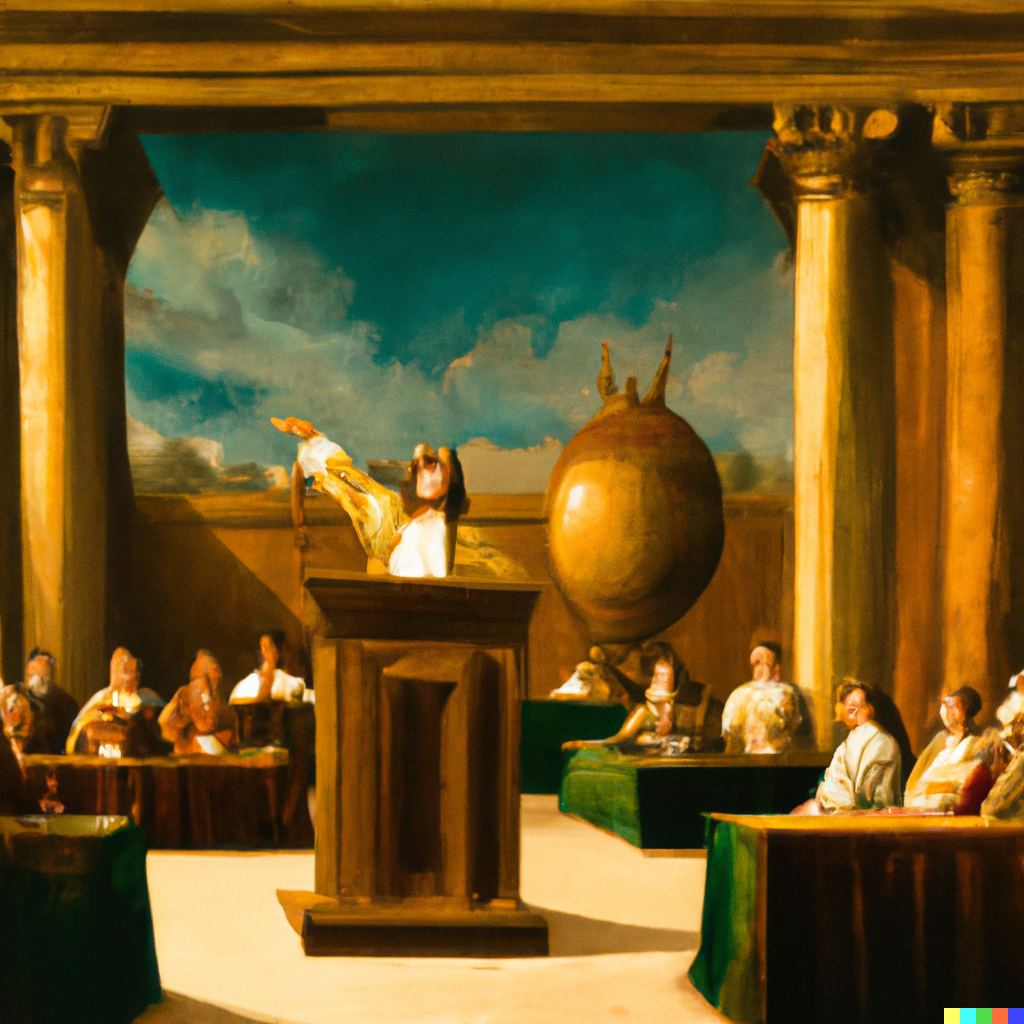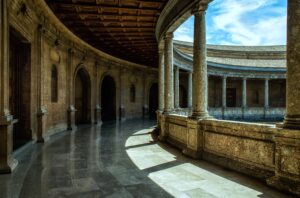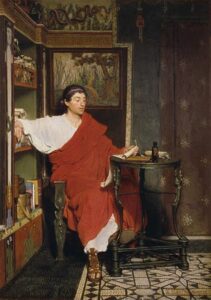The Screwtape Letters is a book by C. S. Lewis wherein is a collection of fictitious letters from Satan to his son advising him on how best to turn humans towards hell. His advice boils down to ‘all you need to do is nudge the believer slightly off the path.’ Satan saw no need convert the believer to a full fledged Wiccan. Just as a small nudge to an archer sends the arrow wildly off its target, a small nudge from Satan can send the believer disastrously off course. This little push can be seen in the non-Biblical creeds men write. Creeds separate Christians from Christians. This is especially evident in the concept of the Trinity. Satan’s fingerprints are all over this.
The very early centuries of Christianity saw converts believing in the Gospels. Simple enough. Some Romans began to ask nosy questions about Christians being polytheists as they believed in three gods, even four if Mary is thrown in the mix as the mother of one of the gods. The hubris of the first theologians caused them to answer in writing. Once written the answer could be criticized and had to be defended. Schools of thought developed in the east in Antioch and Constantinople and in the west in Alexandria and Carthage. The following centuries saw Holy sees established in these cities with all the accoutrements of wealth, power, and prestige. Each jealously protected its power while demanding the others become subservient to their answers, that is their creed.
Whichever city had the most facile answer, and the ear of the emperor, won the power. The argument of the time revolved around understanding the true nature of Jesus and His relation to the Father and the Spirit. Conclaves of bishops convened a number of times to defend one position or another. Ever more precise creeds were drafted explaining the Three in One of the Trinity and the dual nature, or not, of Christ. These creeds defining the true nature of Jesus were voted on and assented to by bishops. The end result of the winning creed was the winning city winning the power.
The process of maintaining power is an interesting one. What it was not was the prayerful meditations of bishops waiting on the Holy Spirit to guide them to a correct understanding of the Trinity. The goal of the process was to protect and hold the see with all of its perks of wealth and power that go along with such a prestigious position. Most often this meant stamping out the opposition, i.e., anathematizing and exiling the opposition – and worse. This process was generally a statement of the opposing positions, arguing the points of each position, voting on the proper position, and writing or revising a new creed for the bishops to sign on to. This seems reasonable as long as they prayed about how to vote.
Fun fact: The Second Council of Ephesus was so rowdy Archbishop Flavian of Constantinople was beaten by a thousand monks while clinging to the altar. (An actual one thousand monks were waiting outside and called in by Dioscorus to do their worst.) After a few days he died because of this beating. At another point during the Council, April 12, 449 to be precise, the holy conclave of bishops became so enraged at the reading of a certain letter that they chanted, “These things pollute our ears. …Cyril is immortal. …Let Ibas be burnt in the midst of the city of Antioch. …Exile is of no use. Nestorius and Ibas should be burnt together!” These are the precise words penned by scribes at the time of this incident. It cannot be stressed enough that our creeds of today were NOT the result of prayerful meditations of devout men of the cloth waiting to be moved by the Holy Spirit.
The process of argument, rebuttal, and voting seems reasonable at first blush. However, the truth is the voting bishops were buttonholed in back rooms by the more powerful in order to convince them of the correct position. This convincing came in the form of beatings, bribes, and threats of exile. It cannot be emphasized enough that intimidation thru violence was the norm and not the exception; for most it did not take much convincing to see the light. Soon there were enough right minded votes to support this creed or that properly defining the relationships of the Trinity. The inspiration of greed, violence, and bribery was surely not God’s intent. Surely it was not God’s intent to split His church into an east warring with a west. This acrimony has Satan’s fingerprints all over it.
In order to win the day, or more properly to justify the day, the first nine Great Councils invented brand new theological terms. Homoousios and homoiousios related the substance of Jesus to the substance of the Father. Prosopon and the hypostatic union related the human and divine elements of Jesus. The Christian world devolved into Dyophysites and Monophysites. Eventually dynamic monarchicianism and modalistic monarcharianism developed. These terms and many others were the result of wrestling with the concept of the Trinity and the person of Jesus.
In modern times theologians and philosophers still wrestle with the Trinity, but rarely does one theologian physically beat another. Their arguments, though, are no less robust. To understand a position these days requires advanced university training. To the regular Christian in the pews the Trinity is a mystery to be left to the theologians. Unfortunately, it is not just set aside as a mystery. The unlearned Christian not only carries the burden of not knowing, but argues their version of the Trinity with other Christians. Satan’s fingerprints are all over this.
In these gentle days of Christianity the Trinity is based on this verse or that depending on one’s sect. Instead of fighting one another over the concept, demure Christians just say it’s a mystery that might be the case. They believe it is only for the highly educated to know such things, so let’s just say the Trinity might be real. It is this state of equivocation that Satan wants in us. As for the mystery of the Three in One and the human and divine in Jesus, Satan’s fingerprints are all over this.
If we cannot be sure of the nature of Jesus and the Trinity, what else are we unsure of? It is a dangerous nudge Satan gives us by fomenting the mystery. This approach is the same as contending all emeralds are grue. This means the jewels are blue in color until they are observed. At the instant they are observed they become green. This might be the case, but it is ridiculous to believe so. No doubt Satan is pleased if we doubt the physical world. But, Satan must be ecstatic when we doubt and “dispute” the Trinity and the nature of Jesus. Satan’s fingerprints are all over this.
Not only was the concept of the Trinity and the nature of Jesus born out of violent intimidation, these issues sow doubt about the very nature of God the Father, Jesus the Christ, and the Holy Spirit. Man’s definitions have split the Christian church, weighed down Christians with an unfathomable mystery, caused rifts among everyday Christians, and have led to ridiculous “it might be” suppositions. Satan’s fingerprints are all over this.
So what is the solution to the conundrums? The first step is to realize the questions are man-made, if not the direct result of Satan’s nudge to contention. The second is to realize some things are secret to God, Christ, and the Spirit. Jesus, the Great Teacher, did not forget to teach the disciples about His nature, He chose to not teach about His nature. Furthermore, He never asked the disciples to write a creed and exhort a theology explaining His nature. Therefore, set these matters aside and do not allow Satan to contend with you. Do not contend with other Christians about such things as the Trinity. Humbly believe in God the Father, Christ the Savior, and the gifts of the Holy Spirit. Life in faith will be light and without provocations with other Christians. Do not be nudged off the path by Satan’s fingerprints.
Copyright 2021 by Greg Hallback







 He struggled to avoid swearing too much at church councils but sometimes all the nonsense just got the best of him. Historical accounts suggest he cussed a lot in Nicea.
He struggled to avoid swearing too much at church councils but sometimes all the nonsense just got the best of him. Historical accounts suggest he cussed a lot in Nicea. Meticulus (the Scribe) was a clear-eyed reporter who tried to see as much as he could and write it all down. He was known to be pretty serious in a light-hearted sort of way and was called Ticulus by his friends.
Meticulus (the Scribe) was a clear-eyed reporter who tried to see as much as he could and write it all down. He was known to be pretty serious in a light-hearted sort of way and was called Ticulus by his friends.